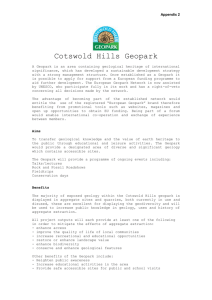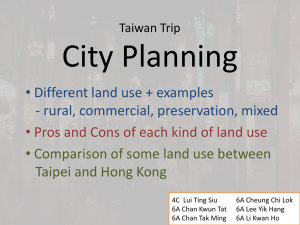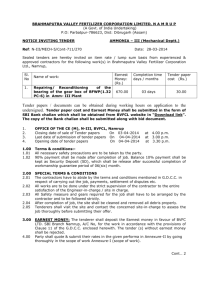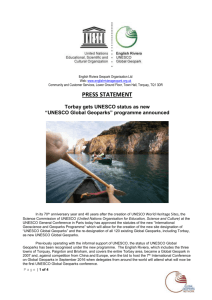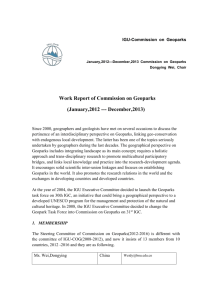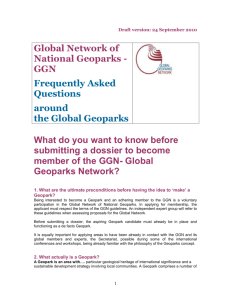Geopark Tender - Pembrokeshire Coast National Park
advertisement
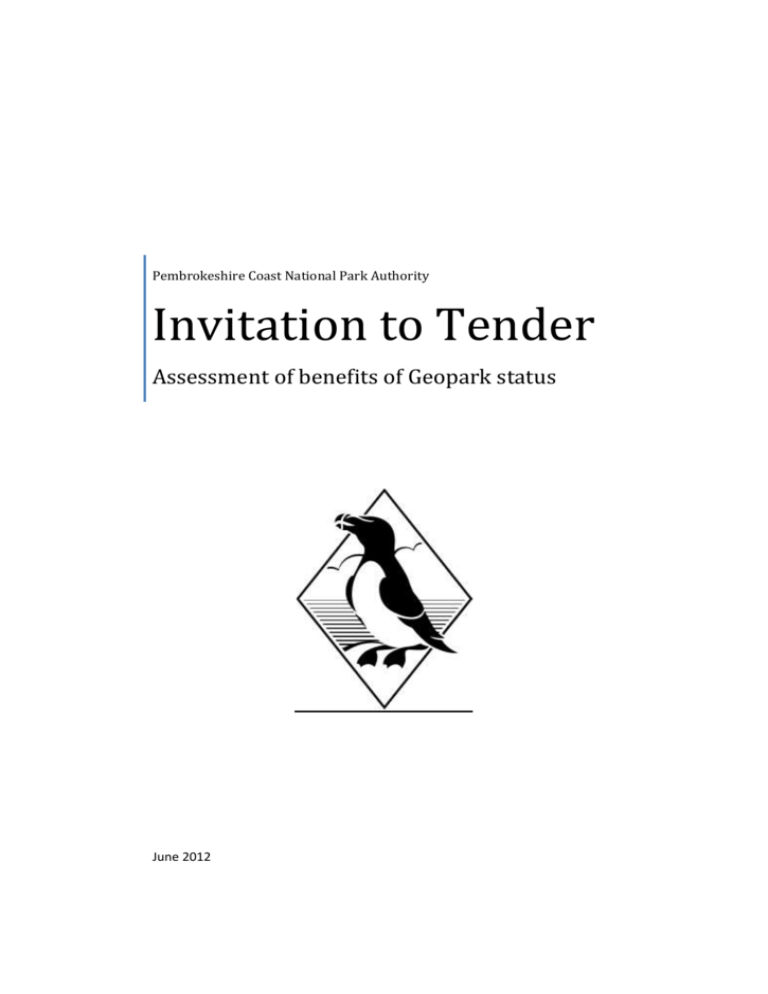
Pembrokeshire Coast National Park Authority Invitation to Tender Assessment of benefits of Geopark status June 2012 Contents Section 1 – Introduction Page 3 Section 2 – Specification of Requirements Page 5 Section 3 - Instructions and information on tender process Page 7 Section 4 – Conditions Page 9 2 Section 1 - Introduction Suitably experienced organisations are invited to submit tenders for the consultancy contract to research and analyse the potential benefits of Geopark status in the Pembrokeshire Coast National Park in accordance with the requirements and conditions set out in this document. Background The Pembrokeshire Coast National Park covers an area of 620km2 of spectacular landscape around Wales' south-western shore, with around 23,000 people living in some 50 community council areas. At its widest it is about 16km wide and at its narrowest only 200m. Most of the National Park is in private ownership. It was designated in 1952 under the National Park and Access to the Countryside Act 1949. Pembrokeshire Coast National Park Authority The Pembrokeshire Coast National Park Authority (the Authority) was created as a free standing special purpose local authority under the 1995 Environment Act. The Authority consists of 18 Members, 12 nominated by Pembrokeshire County Council and six appointed by the Welsh Government. Park Purposes The Act specifies that the purposes of a National Park Authority are To conserve and enhance the natural beauty, wildlife and cultural heritage of the park area To promote opportunities for the understanding and enjoyment of the special qualities of the area by the public. The Act also states that in pursuing these purposes the Authority has a duty to seek to foster the social and economic well being of local communities. Further information about the National Park and the Authority are available from www.pembrokeshirecoast.org.uk Geopark Established in 2000, the European Geoparks Network (EGN) aims to protect geodiversity, to promote geological heritage to the general public as well as to support sustainable economic development of geopark territories primarily through the development of geological tourism. The network has drawn together territories from across Europe that share these aims and which are now working together in an active and dynamic way to achieve them. 3 Originally consisting of four territories, the network has, as of April 2010, been expanded to include 43 territories across 17 European countries. The network operates primarily by continuous electronic communication, frequent coordination meetings, annual conferences and the establishment of common projects through which territories can exchange ideas, experience and best practice thereby supporting each other to fulfil our common goals. Although geology is always the main area of promotion in Geoparks, network members adopt a holistic approach to the promotion of our natural and cultural heritage. Furthermore all members consider full local community involvement as essential to our success. There is a variety of activities that can be considered typical of a Geopark. Most are either geotourism– or educational-based, including schools programmes, guided walks and museum exhibitions. Geological heritage protection and promotional activities are also essential activities of a Geopark. Socio-economic activities in Geoparks are important for sustainable regional development. Geoparks adopt a holistic approach to their heritage and promote all aspects of their regions natural and cultural heritage. The network is funded by its members and through collective bids for European Union funding for common projects. Further information may be found at http://www.europeangeoparks.org/ 4 Section 2 – Specification of Requirements The Pembrokeshire Coast National Park was designated in 1952 with geo-diversity cited as one of the main reasons. This National Park has a greater variety of geological and landform scenery than any area of the same size in the British Isles with over 50 Geological Conservation Review sites. The area also has many biodiversity designations, including 60 sites of special scientific interest, and 279 scheduled ancient monuments. The Pembrokeshire Coast National Authority is now considering applying for Geopark status, but before submitting an application the Authority is inviting tenders to assist the Authority in assessing the potential benefits and drawbacks of Geopark status by a review of other similar areas and a preliminary collection of information likely to be of use in preparing the formal application. A second tender may be let to assist the preparation of the application later this year. The assessment, which should be based primarily, but not exclusively, on evidence from Geoparks in the British Isles, will include the following: 1) Socio-economic benefits from Geopark status a) What evidence is there to show how communities in or near other Geoparks have benefitted? b) Which sections of existing Geopark local economies have benefitted most? c) Have any areas of the local economies declined due to Geopark status? d) Which existing Pembrokeshire economies would be most likely to benefit and which might be prepared to engage with a Geopark scheme? e) Is investment needed to develop new economic benefits from Geopark status? 2) National Park Purposes a) How will Geopark status help deliver National Park purposes? b) Is there evidence to show that Geopark status has helped to conserve other protected or sensitive landscapes? c) Has local biodiversity benefitted or suffered from Geopark status elsewhere? d) Has Geopark status increased or restricted access to the wider countryside? e) How has Geopark status improved the general public’s understanding and enjoyment of the special qualities of protected areas? 3) Longer term impact and implications a) Does Geopark status provide prolonged and sustainable benefits? b) What resources (time and funding) are required to maintain Geopark status and the benefits? 5 4) Partnerships and Community engagement a) Which organisations should be partners and to what extent? b) How well is Geopark status appreciated by local communities? 5) Designation a) Is Geopark status appropriate for the whole of the National Park or should this be restricted to a smaller area and if so where? 6) Application information a) Identify key areas and features which should be high-lighted in the application for Geopark status b) Identify any good practice or other relevant information from applications/annual reports from other Geoparks. 6 Section 3 - Instructions and information on tender process These instructions are designed to ensure that all tenders are given equal and fair consideration. It is important, therefore, that bidders provide all the information asked for in the format and order specified. If there is any doubt as to what is required, or if bidders have difficulty in providing the information requested, they should contact alanh@pembrokeshirecoast.org.uk. Submission The tender submission must include the following: Introduction and Company profile A description of how your organisation intends to deliver the required project, with an indication of the nature of research and analysis and an estimate of the time involved. Tenderers are encouraged to be innovative in their approach. Summary of costs. All expenses and disbursements should be included. Company track record in providing similar services Summary of staff involved in the project and their rates Timetable and Administration Arrangements The envisaged key milestones for the tender are shown in the table below. No Event Date 1 2 3 4 5 6 7 Issue of ITT Final date for receipt of any bidder’s questions Responses to questions circulated Deadline for return of tenders Complete evaluation of tenders Presentations (if Required) Notification of bidders of decision on tender submission Contract Initialisation Interim progress report Final Report 22nd June 2012 4th July 2012 9th July 2012 12 noon – 13th July 2012 25th June 2012 Tba 6th August 2012 8 9 10 13th August 2012 30th September 2012 9th November 2012 Queries Pembrokeshire Coast National Park Authority will endeavour to deal with queries from bidders during the tender period. Bidders should be aware that, unless a query relates specifically to them, any questions they raise during the tender period, together with answers, will be circulated to all bidders in accordance with the timetable above. 7 Bidders should send their questions via email to alanh@pembrokeshirecoast.org.uk quoting the tender title in the subject line and should be received no later than the deadline date for questions as indicated in the timetable. Oral questions will not be accepted. We will respond directly to bidder questions but compile a list of questions and answers to circulate by the date indicated. Tender Responses Responses must be on paper, please ensure that the title ‘Geopark Tender’ is on the package and no means of identifying the bidder is visible. Tenders must be received no later than the time and date indicated in the timetable. Tender responses should be returned as a pdf document by e-mail to Richard Griffiths, Finance Manager, Pembrokeshire Coast National Park: richardg@pembrokeshirecoast.org.uk by 12 noon on 13th July 2012. Submissions may be excluded: o If received after specified date. o If, in the opinion of PCNPA, it does not substantially meet the requirements of the Brief. o If any mandatory requirements or the conditions and Brief are disregarded. Evaluation Criteria The evaluation will be based on the contents of the document(s) submitted to Pembrokeshire Coast National Park Authority. You may be contacted during this stage to clarify the content and meaning of details within your response, and Pembrokeshire Coast National Park Authority reserves the right to invite bidders to attend an interview prior to deciding on the successful tender. Responses will be evaluated under the following criteria scored using the specified weightings: o Price – 50%; Quality - 50% Budget It is anticipated that the total cost of this contract will not exceed £10,000 excluding vat. 8 Section 4 - Conditions 1 The working conditions for this project are confidential. The bidders must not discuss their findings or proposals with any third party without prior approval of the Pembrokeshire Coast National Park Authority. 2 It will be a condition of the appointment that the Consultant will hold the Pembrokeshire Coast National Park Authority indemnified against any claims arising from the project whether caused by negligence or otherwise. The Consultant will be required to carry Professional Indemnity Cover of at least £2,000,000. 3 Copyright for all work produced will rest with Pembrokeshire Coast National Park Authority. 4 The timetable for the contract is set out in section 3 and may not be varied without permission of Pembrokeshire Coast National Park Authority. 5 The lead consultant must be responsible for all of the work of the whole team. If any part of the work is sub-contracted this must be made clear in the submission and details of sub-contractors provided. 6 The final report must be provided electronically as a pdf document, either emailed, or on cd or memory stick. Additional paper versions will be accepted. 7 Competitors must not discuss their Proposal with Members or Officers of the Pembrokeshire Coast National Park Authority or with third parties. 8 Offering an inducement of any kind in relation to obtaining this or any other contract with Pembrokeshire Coast National Park Authority will disqualify the relevant tender from being considered. 9 Pembrokeshire Coast National Park Authority does not bind itself to accept the lowest or any proposal nor will it be responsible for or pay any expenses or losses which may be incurred by the bidder in the preparation of their proposal. 10 Unless otherwise stated by the bidder, tenders will remain valid from 90 days from the closing date. 11 Appointment of the successful bidder will be by letter. 9 12 Pembrokeshire Coast National Park Authority reserves the right to amend the tender documents at any time prior to the closing date. If the amendments are significant, Pembrokeshire Coast National Park Authority may at its discretion extend the deadline. 13 Bidders will not be entitled to claim from Pembrokeshire Coast National Park Authority any costs or expenses which they may incur in preparing their tenders, regardless of whether or not their tender is successful. Travel expenses for attending interviews or presentations as part of the tender process will not be reimbursed. 14 The Freedom of Information Act 2000 applies to all the activities of the Pembrokeshire Coast National Park Authority. As a tenderer providing services to the Authority you must be aware of the Authority’s obligations and responsibilities and of the Freedom of Information Act 2000 provide on request access to recorded information held by it. One of the consequences of these new statutory responsibilities is that information that the Authority holds about your organisation may be subject to disclosure in response to a request unless the Authority decides that one of the various statutory exemptions applies. If at any stage of the contracting process you provide any information to the Authority in the expectation that it will be held in confidence then you must make it clear in your documentation as to the information to which you consider a duty of confidentiality applies. 10
